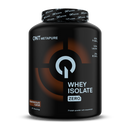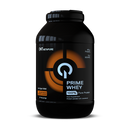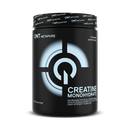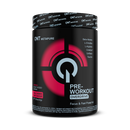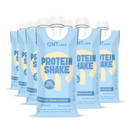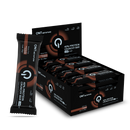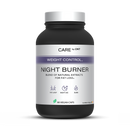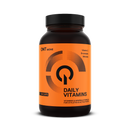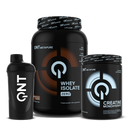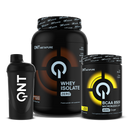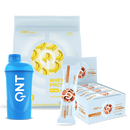Table of Contents
What is l-carnitine ?
L-Carnitine is a natural substance found in the body, playing a crucial role in energy production. It is produced by the liver and kidneys through the conversion of two essential amino acids: lysine and methionine. L-Carnitine is essential for the transportation of long-chain fatty acids to the mitochondria, where they undergo oxidation for energy production. That's why it is often associated with improved endurance and reduced muscle fatigue.
The different forms of L-Carnitine.
There are several forms of carnitine, each with specific uses:
- L-Carnitine Tartrate: The most common form, known for its rapid absorption and often used to support sports performance.
- Acetyl-L-Carnitine: Known to more easily cross the blood-brain barrier, thus promoting cognitive health and brain function.
- Propionyl-L-Carnitine: Specifically studied for its effects on blood circulation and cardiovascular health.
How to use L-Carnitine ?
- For sports performance: L-Carnitine is particularly favored by athletes for its ability to enhance endurance and speed up recovery after exercise. The recommended dose typically ranges between 500 mg and 2,000 mg per day, taken approximately 30 minutes before physical activity. It is even more effective when consumed with carbohydrates, which promotes its absorption and utilization by the body.
- For weight loss: By helping to more effectively transport fats into the mitochondria to be burned, L-Carnitine can also play a role in weight management. However, it should be accompanied by a balanced diet and regular exercise program to be truly effective.
- For general well-being: Beyond sports performance and weight management, L-Carnitine can contribute to improving overall health, including supporting cardiac functions and reducing the risk of chronic diseases.
L-Carnitine is a versatile supplement that can support a wide range of goals, from enhancing sports performance to promoting overall health. As always, it's advisable to consult with a healthcare professional before incorporating L-Carnitine or any other supplement into your regimen, especially if you have pre-existing medical conditions. With the right approach, L-Carnitine can be a fantastic asset to help you unlock your potential and achieve your ideal form.
The importance of timing.
The timing of consuming L-Carnitine can have a significant impact on its effectiveness, especially concerning enhancing sports performance and muscle recovery. L-Carnitine works by facilitating the movement of fatty acids into the mitochondria of cells, where they are oxidized to generate energy. Therefore, the timing of its consumption can influence the availability of fatty acids for energy, reduction of fatigue, and the speed of recovery after exercise.
Before exercise.
Taking L-Carnitine approximately 30 to 60 minutes before training can be particularly beneficial for athletes seeking to enhance their endurance and performance. This window allows the L-Carnitine to be absorbed by the body and ready to transport fatty acids to the mitochondria at the onset of physical activity. This can not only help increase the utilization of fats as an energy source but also reduce the consumption of muscle glycogen reserves, thereby delaying the onset of fatigue.
After exercise.
Consuming L-Carnitine after training can also be strategic, especially for recovery. It helps reduce muscle damage and speeds up the repair process. Additionally, by enhancing fat metabolism even after exercise, it can contribute to better weight management. For these reasons, taking L-Carnitine after training, along with a source of protein and possibly carbohydrates, can promote muscle recovery and replenishment of energy reserves.
With meals.
For those specifically targeting weight loss or better energy management throughout the day, consuming L-Carnitine with meals can be advantageous. The presence of carbohydrates and proteins in the meal can enhance the absorption of L-Carnitine and optimize its effectiveness in transporting fatty acids. This can be particularly useful during meals preceding a workout or as part of a post-exercise recovery strategy.
The optimal timing for taking L-Carnitine largely depends on your specific goals: improving performance, supporting recovery, or managing weight. In general, consuming it 30 to 60 minutes before exercise can maximize the benefits related to performance and endurance, while taking it after exercise can support muscle recovery. Remember, the effectiveness of L-Carnitine can vary from person to person, so listen to your body and adjust your usage based on your personal responses and goals.
The benefits of carnitine.
Carnitine, often associated with L-Carnitine, plays a crucial role in the body's energy metabolism. Here is a selection of its most notable benefits:
- Enhanced sports performance: By facilitating the transport of fatty acids to the mitochondria for conversion into energy, carnitine can help improve endurance and reduce fatigue during exercise.
- Weight loss support: By optimizing fat burning for energy, carnitine can contribute to more effective weight management, in addition to a balanced diet and regular exercise program.
- Muscle recovery: Carnitine can help reduce exercise-induced muscle damage, thereby accelerating recovery and reducing muscle soreness after training.
- Heart health: Some studies suggest that carnitine may have beneficial effects on cardiovascular health, including improving blood circulation and reducing blood pressure.
- Cognitive support: Acetyl-L-Carnitine, a form of carnitine, is recognized for its potential effects on improving cognitive function, especially in the elderly or those with certain neurological conditions.
Usage tips.
To make the most of the benefits of carnitine, here are some recommendations:
- Dosage: The recommended daily dose of L-Carnitine typically ranges from 500 mg to 2,000 mg, although some benefits may be observed with lower doses. It's advisable to start with a lower dose and gradually increase as needed and based on your body's response.
- Timing: As mentioned earlier, taking L-Carnitine 30 to 60 minutes before exercise can enhance performance and endurance, while taking it after training can promote muscle recovery.
- Diet: Consuming L-Carnitine with carbohydrate-rich and protein-rich foods can enhance its absorption and effectiveness, thanks to increased insulin that facilitates the transport of carnitine into muscle cells.
- Hydration: Maintaining proper hydration is crucial when taking supplements, including L-Carnitine, to help optimize their absorption and function in the body.
Carnitine offers an impressive range of health benefits, sports performance, and general well-being. By following these usage tips, you can maximize these benefits to achieve your fitness and health goals. As always, it is recommended to consult a healthcare professional before adding L-Carnitine or any other supplement to your regimen, to ensure that it suits your specific needs and health situation.
Why does taking carnitine before exercise make you sweat more ?
Carnitine is often associated with increased sweating when taken before exercise. This phenomenon can be explained by several mechanisms related to its action in the body:
- Increased fat metabolism: Carnitine plays a key role in transporting fatty acids to the mitochondria of cells, where they are burned to produce energy. This process can increase basal metabolism and heat production (thermogenesis), which can result in increased sweating as a means for the body to regulate its temperature.
- Improved physical performance: By facilitating the use of fats as an energy source, carnitine can contribute to enhancing endurance and performance during exercise. This may lead individuals to train more intensely or for longer durations, thus generating more body heat and consequently increased sweating to help cool the body.
- Vasodilatory effect: Some compounds in carnitine may have a vasodilatory effect, improving blood circulation to muscles and skin. This increase in blood flow can also contribute to elevation of body temperature and increased sweating in response to physical exertion.
It's important to note that the response to carnitine supplementation, including its effect on sweating, can vary significantly from person to person depending on factors such as individual metabolism, intensity and duration of exercise, as well as other aspects of their diet and lifestyle.
L-carnitine and weight loss: what does science say ?
L-Carnitine is recognized for its role in transporting fatty acids to the mitochondria, where they are burned to produce energy. This function has led to the hypothesis that L-Carnitine could help increase fat burning and, consequently, promote weight loss.
Several studies have explored this relationship, with varied results. Some research suggests that supplementation with L-Carnitine, when combined with exercise, may lead to more significant weight loss compared to exercise alone. However, other studies have not found a notable difference in terms of weight loss or body composition between those taking L-Carnitine and those who do not.
It's important to note that L-Carnitine appears to be more effective when combined with a balanced diet and regular exercise program. Weight loss cannot be solely attributed to L-Carnitine supplementation; it should be viewed as an additional tool in a broader weight management plan.
How to use L-Carnitine for weight loss ?
If you're considering incorporating L-Carnitine into your weight loss strategy, here are some tips to optimize its effectiveness:
- Pair it with exercise: L-Carnitine can be particularly beneficial for increasing endurance and performance during exercise, which can help burn more calories and promote weight loss.
- Consider timing: Taking L-Carnitine 30 to 60 minutes before training can maximize its potential to increase the use of fats as an energy source.
- Maintain a balanced diet: L-Carnitine cannot compensate for a poor diet. For effective weight loss, it should be accompanied by a nutrient-rich, balanced diet, and controlled calorie intake.
- Hydration: Drinking enough water is crucial, especially when using supplements and during exercise, to help optimize metabolism and the weight loss process.
L-Carnitine can play a supportive role in a weight loss strategy, especially when combined with exercise and a healthy diet. However, it's not a miracle solution. The key to sustainable weight loss lies in a balanced lifestyle, including healthy eating and regular physical activity. As always, it's recommended to consult a healthcare professional before starting any new supplement, to ensure it's suitable for your personal needs and goals.
Expert opinions.
Experts in nutrition and sports medicine generally recognize the benefits of carnitine, while emphasizing the importance of a balanced approach. They often recommend carnitine as a useful, but not exclusive, supplement to improve physical performance, support weight loss, and promote muscle recovery. However, they insist that carnitine must be accompanied by a healthy diet and appropriate exercise program to be truly effective.
Tips for adding Carnitine to your diet.
Prior Consultation: Before incorporating carnitine or any other supplement into your diet, it's crucial to consult a healthcare professional to ensure there are no contraindications or interactions with other medications.
Appropriate Dosage: The recommended dose of carnitine varies depending on individuals and goals. Start with a low dose and adjust based on your response and the recommendations of your healthcare professional.
Timing of Ingestion: To maximize the benefits of carnitine on performance and recovery, consider taking it 30 to 60 minutes before exercise. For weight loss and metabolic support, taking it with meals may be beneficial.
Balanced Diet: Carnitine works best when integrated into a nutrient-rich and balanced diet. Ensure you're consuming enough protein, complex carbohydrates, and healthy fats.
Carnitine offers a wide range of potential health and physical performance benefits. By following expert advice and adopting a balanced approach, you can make the most of this supplement to achieve your health and fitness goals. Remember, the key to success lies in consistency and commitment to a healthy lifestyle overall.
Coach's advice.
- Taking carnitine just before exercise acts quickly and allows you to truly feel its effects. You will sweat more than usual when using it before exercise.
- Combining the action of carnitine with fat burners can boost your metabolism towards significant fat loss.
- QNT's carnitine drinks are highly concentrated (2 g) and will allow you to hydrate yourself but also provide your body with carnitine before, during, and after exercise. Carnitine-enriched water provides 200 mg of carnitine for only 5 kcal.
Read more
 Training
TrainingGroup classes more effective than classroom work?
We often ask this question: which one is the most effective? Group training or individual workout programs in the gym? Let's first consider the two...
Summer body edition for men: How to prepare your body?
Gentlemen ? The return of the sun and its warm rays are almost here! The degrees are slowly but surely rising, but what about your muscles? Ouch! I...
 Training
TrainingSHOULD YOU USE A WEIGHT BELT FOR LIFTING?
The next person you see in the squat cage with 20 kg on the bar and a big belt, maybe you can make a comment after reading these few lines.
 Our Tips
Our TipsHow to train flexibility?
The way to train flexibility is often highly controversial. Depending on the sports you practice, you work differently. A dancer and an athlete tra...
 Dietary Supplements
Dietary SupplementsWhy take turmeric?
There are hundreds and hundreds of spices with different properties and turmeric is obviously one of them! It is a spice that is generally quite we...
Which fat burner to choose?
To lose weight and burn fat, there is no secret: you have to do sport and take care of your diet. However, it is possible to speed up the process t...
 Our Tips
Our TipsFasting and sport: 9 tips for training during Ramadan.
Working out during Ramadan is not easy. Not eating from sunrise to sunset is a major challenge for athletes wishing to continue their activities. T...
 Our Tips
Our TipsSummer holidays: How to limit the damage?
On holiday, we often tend to let ourselves go. Unless you're a hardcore sportsman, you tend to abandon your trainers and indulge in a lot of dietar...
 Health
HealthHow to preserve your joints?
We have a total of about 400 joints located throughout the body. We therefore quickly understand why joint problems are quite common. You don't hav...
 Our Tips
Our Tips9 good reasons to do sport.
Sometimes the urge to exercise is not always there. And although we always tell ourselves that this year will finally be the right one to get back ...


